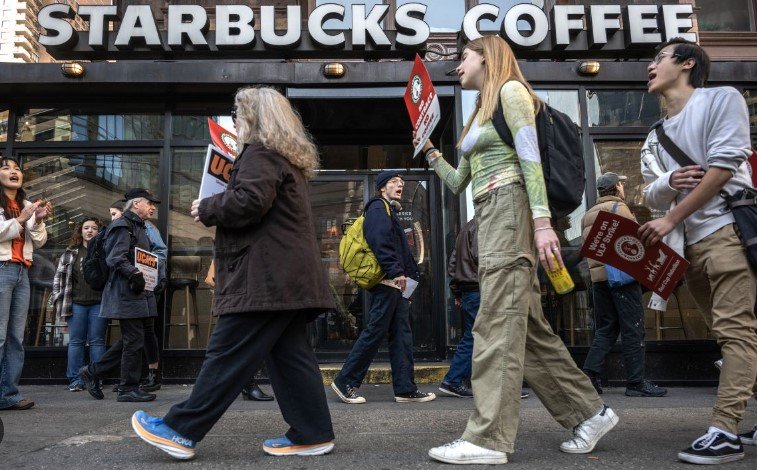Red Cup Day is an annual event that Starbucks holds to celebrate the start of the holiday season. Customers who order a holiday or fall beverage get a free reusable red cup with a festive design. The cups are limited in quantity and usually run out quickly.
However, this year, Red Cup Day was also marked by a nationwide strike by more than 2,000 Starbucks workers who are members of the Starbucks Workers Union. The union, which is affiliated with Workers United, has been organizing stores for the last year to demand better pay, staffing, schedules, and working conditions. The union also accuses Starbucks of illegally retaliating against union supporters and refusing to bargain in good faith.
The strike, which the union dubbed the “Red Cup Rebellion”, involved workers walking off their jobs at over 100 company-owned stores across the country. The workers also handed out red union cups to customers instead of the official Starbucks ones. The union said this was the biggest coordinated national action by unionized Starbucks stores in the campaign’s history.

How did Starbucks respond to the strike?
Starbucks said it respects the rights of its workers to express their views, but it does not agree with the union’s claims. The company said it has been engaging with the union and has offered to meet with them to discuss their concerns. Starbucks also said it has been investing in its workers by raising wages, expanding benefits, and providing opportunities for career growth.
Starbucks CEO Howard Schultz, who is also a former presidential candidate, denied that he was union-busting or firing workers for organizing. He said he supports the right of workers to choose whether or not to join a union, but he believes that Starbucks is better off without one. He said he wants to maintain a direct relationship with his workers and foster a culture of trust and respect.
Schultz also defended the company’s performance and profitability, saying that Starbucks has been delivering value to its customers, shareholders, and communities. He said he was proud of the company’s social and environmental initiatives, such as supporting veterans, refugees, and farmers. He said he was confident that Starbucks would overcome the challenges posed by the pandemic, the labor market, and the competition.
What are the implications of the strike for the coffee industry and the labor movement?
The strike by Starbucks workers is a significant development in the coffee industry, which has been facing labor shortages, supply chain disruptions, and rising costs. Starbucks is the largest coffee chain in the US, with over 15,000 stores and 200,000 workers. The company has a strong brand image and loyal customer base, but it also faces competition from other chains, such as Dunkin’ and McDonald’s, as well as independent coffee shops.
The strike is also a notable event in the labor movement, which has been gaining momentum and visibility in recent months. Workers in various sectors, such as health care, education, entertainment, and retail, have been organizing, striking, and demanding better wages and working conditions. The movement has been fueled by the pandemic, which exposed the vulnerabilities and inequalities of the workforce, as well as by the support of political leaders, such as President Joe Biden and Senator Bernie Sanders, who have endorsed the rights of workers to unionize and bargain collectively.
The outcome of the strike by Starbucks workers could have a ripple effect on the coffee industry and the labor movement, as it could inspire more workers to join or form unions, or it could discourage them if they face resistance or retaliation from their employers. The strike could also affect the relationship between Starbucks and its customers, as it could either increase their loyalty and sympathy, or it could alienate them and drive them to other options.






